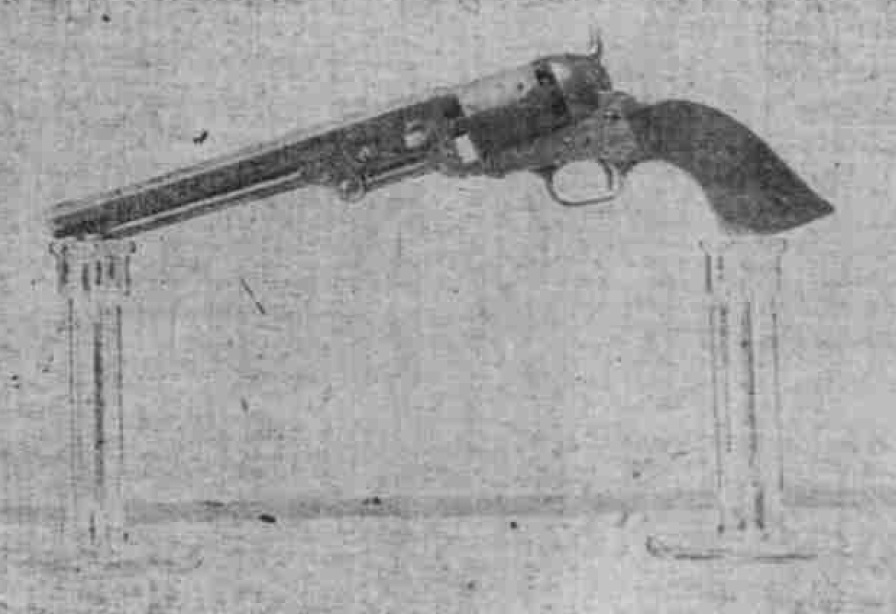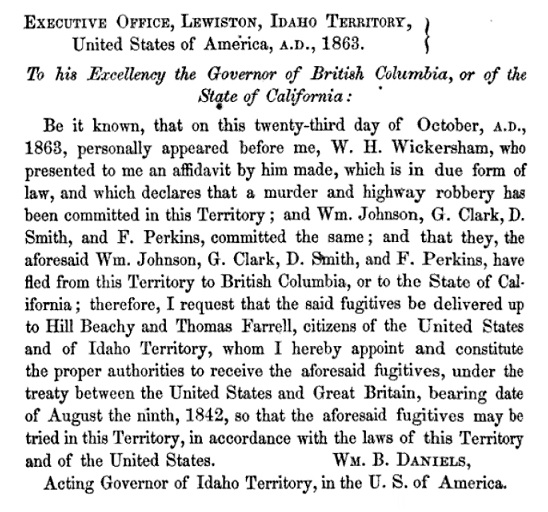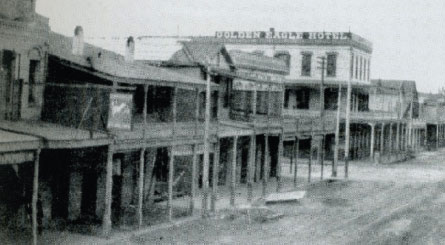launched August 3, 2013
to
project
home page
to Hill Beachey Day Proposed
to research question number 1
to research question number 2
to research question number 3
to research question number 4
to research question number 5
to research question number 6
to research question number 7
to research question number 8
to Hill Beachey Day Proposed
to research question number 1
to research question number 2
to research question number 3
to research question number 4
to research question number 5
to research question number 6
to research question number 7
to research question number 8
Research
Question Number 6: Time to look more closely at Wesley H.
Wickersham's role?

Magruder's revolver (Sunday Oregonian, April 5, 1914)
Sometimes the elements of a story dawn on me only slowly.
What's dawning on me at this moment is that Wesley H. Wickersham played a bigger role in the apprehension of Lloyd Magruder's killers than I -- or perhaps anyone else, for that matter -- have accorded him.
The first item of evidence for Wickersham's role's importance is the fact that it was he, and not Beachey, who asked acting territorial governor, William B. Daniels, to issue a warrant for the four suspects.
A package comprising the warrant (which the court referred to as a "requisition") and four items of accompaning documentation is reproduced in Reports of Cases Determined in the Supreme Court of the State of California (Vol. 23, San Francisco: H.H. Bancroft & Co., 1864, pp. 586-588). The package's elements:

Daniels' warrant, as reproduced in the
California Supreme Court's record
Who was Wesley H. Wickersham and how did he come to occupy this important role in the Magruder/Beachey story?
It appears that Wickersham and Magrruder were close, although just how close remains to be established.
Unfortunately, only snippets of information on Wickersham and his relationship to Magruder are available in the literature:

Magruder's revolver (Sunday Oregonian, April 5, 1914)
Sometimes the elements of a story dawn on me only slowly.
What's dawning on me at this moment is that Wesley H. Wickersham played a bigger role in the apprehension of Lloyd Magruder's killers than I -- or perhaps anyone else, for that matter -- have accorded him.
The first item of evidence for Wickersham's role's importance is the fact that it was he, and not Beachey, who asked acting territorial governor, William B. Daniels, to issue a warrant for the four suspects.
A package comprising the warrant (which the court referred to as a "requisition") and four items of accompaning documentation is reproduced in Reports of Cases Determined in the Supreme Court of the State of California (Vol. 23, San Francisco: H.H. Bancroft & Co., 1864, pp. 586-588). The package's elements:
- First, Daniels'
formal
"requisition," dated October 23, 1863, requesting of the governors of
British
Columbia and California that the named fugitives "be delivered up to
Hill Beachy and Thomas Farrell." Daniels
signed the document in his capacity as Acting Governor of Idaho
Territory. The warrant's text makes abundantly clear that
Wickersham's affidavit prompted its issuance.

Daniels' warrant, as reproduced in the
California Supreme Court's record
- The second
item, which ran a mere single sentence, finds Daniels witnessing his
own
signing of
the warrant, now acting in
his capacity as Secretary of Idaho
Territory.
- The third document was Wickersham's affidavit itself. It asserted that four named suspects "...did, on or about the fifth day of October, a.d., 1863, wickedly and maliciously with malice aforethought, waylay, rob, and murder, one Lloyd Magruder and Charles Allen, citizens of the United States, on the trail, or road, leading from Virginia City to Lewiston, in said Territory, contrary to the laws made and provided, and against the peace and dignity of this Territory..." This document began, illogically, with a sentence making reference to Wickersham appearing before another party, presumably Daniels. This opening sentence probably evidenced the haste with which it and the other documents were prepared.
- The fourth document was signed by Alleck C. Smith, Associate Justice of the Idaho Supreme Court. It affirmed that Wickersham's affidavit had been signed and sworn, and, as well, that Wickersham was "a credible witness" and "worthy of belief." Smith also noted that "as yet, the Supreme nor District Court of this Territory have not been organized, and that as yet no seal has been adopted for said Court."
- Finally, the fifth document, signed by Daniels in his capacity as territorial secretary, certified "...that the above-named Alleck C. Smith, is duly appointed and qualified as an Associate Justice of the Supreme Court of Idaho Territory ; and that as such, full faith and credit should be given to all his official acts ; and that the above affidavit is in due form of law, and that full faith and credit should be given to the same."
Who was Wesley H. Wickersham and how did he come to occupy this important role in the Magruder/Beachey story?
It appears that Wickersham and Magrruder were close, although just how close remains to be established.
Unfortunately, only snippets of information on Wickersham and his relationship to Magruder are available in the literature:
- Julia Conway Welch's book suggested a number of leads re that relationship. I've plucked these out for our examination:
- Magruder, as a Private in the Quartermaster's Corps of Archibald Yell's regiment, took part in the Mexican-American War's Battle of Buena Vista in February, 1847. Welch wrote: "For years afterwards, February 22 and 23, 1847, must have been days that Lloyd remembered and talked about as red letter days in his life. In Marysville, California, he was to meet a veteran of the other famous battle of the War-- Cerro Gordo. Wesley Wickersham, friend to Lloyd for many years, fought under Scott in an Illinois regiment. But he was a native of Kentucky and, like Lloyd, a southern loyalist" (emphasis added, p. 8).
- Among his other pursuits there, Magruder served as Yuba County's county clerk in Marysville. Welch wrote: "After his term as county clerk expired in 1858, he also worked as assistant marshall [sic] in the office of County Recorder Wesley Wickersham, where he took the census of Yuba County" (p. 18).
- Welch added, in relation to a later year, perhaps 1859 or 1860: "He was now working the the recorders's and clerk's office (Wesley Wickersham was his boss) at $175 a month and practicing 'a little law' on the side. He was planning on leaving Marysvill in January for 'the Washoe mining district of Nevada'" (pp. 18-19).
- Magruder had great difficulty securing his pay for his work on the 1860 census, which in turn caused his family considerable financial embarrassment. In 1861, Magruder wrote to his older brother, Thomas, asking him to send monies he might receive as pay for his census work to Wickersham in Marysville. Welch quoted from Magruder's letter: "I am under the necessity of leaving without ample provision for them [his family] as I could desire, but have done the best I can. I hope you will use every effort to further my getting the abount due me from the Government" (in Welch, p. 28).
- Welch added that Magruder's family -- his wife Caroline and children -- may have stayed with the Wickersham family after Lloyd's departure. The Wickershams, according to Welch's account, were better fixed than the Magruders. "Wesley had real estate," she wrote, "valued at $2,500 and personal property valued at the same figure. His household, in addition to his wife Maria and brother James, include a German cook and an Indian boy as servants. It is possible, too, that Lloyd's project of taking a mule train to the new bonanza was an investment of the Wickershams, for Wesley's brother accompanied him, and Wesley himself was listed as a parner in Lloyd's store in Elk City" (in Welch, p. 28).
- Finally,
there
is a rather cyptic mention of Wicksham much later in Welch book, one
concerning the fugitives as they approached Lewiston after the
crime. Welch writes that the men "abandoned a mule and hid some
ropes and a pack saddle" on Cottonwood Creek. "This was a major
error," she added, "for the animal and gear were found and helped
corroborate Page's story." Welch further recounts that Wickersham
and Charles Frush "went out and found them where Page said they
were..." (p. 72). This does not appear to be the clues at Tammany
Hollow or Tammany Flat that would later play so important a role in
prompting Beachy to give chase. But when, exactly, this recovery
by Wickersham and Frush happened I don't know.
- Magruder and
Wickersham were fellow members of Marysville's Masonic lodge,
"Corinthian Lodge, No. 69."
Wickersham is listed among four "Past Masters" and Magruder among a
host of "Master Masons" (see pp. 172 & 443, Journal of Proceedings of the Grand Lodge
of Free and Accepted Masons of the State of California, Vol. 5,
1861 and 1862). Incidentally, the same volume lists Hill Beachey
as a "Withdrawn" member of the "Vesper Lodge, No. 84, Red Bluffs,
Tehema County" (ibid., p. 451).
- The Illustrated History of North Idaho (1903) offers the following sentence about business establishments in early Elk City: "Joel D. Martin tells us that when he came to the town in the early summer of 1862, he found merchandizing establishments belonging to Clindinning, Magruder & Wickersham, Straven & Company, Creighton & Company, a man named Claflin and others, besides five saloons and two principal hotels, Ralph's and the Marsten house” (emphasis added, p. 23).
- Finally, we come to a new
clue. The Sunday
Oregonian of April 5, 1914 published an article on the Magruder
murders highlighting a pistol in the posssession of one L.A. Wright of
Union, Oregon. The weapon was described as "a navy revolver, for
percussion caps, powder and balls," once owned by George Wright.
A pair of these pistols had been sold to Lloyd Magruder before his
fateful venture to Virginia City. The Oregonian's article
recounted that the relic had been recovered by Magruder's friends and
presented to George Wright "by Magruder's
brother-in-law, Wickersham"
(emphasis added). Brother-in-law?! Magruder's wife's maiden
name was Caroline Pelham of Batesville, Arkansas. It would seem
to follow that Wesley Wickersham, if the brother-in-law relationship
were true, must have been married to a Magruder. Welch's book
says Wickersham's name was Maria. Welch's book relates that Lloyd
was one of Lloyd, Sr.'s thirteen children by two wives, but the name
"Maria" is not specifically mentioned as one of the younger Lloyd's
sisters.
All of
which leaves us with some intriguing prospects and good questions for
further research.
- Was Wickersham particularly disposed
toward capturing Magruder's killers because the two men were
brothers-in-law?
- Was Wickersham also perhaps a financial
backer of Magruder's trading venture?
- And, if so, might Wickersham have also
been motivated by the prospect of recouping some of Magruder's revenue
from the killers?
- Indeed, did Wickersham make any effort to
recoup any of his investment following the capture of the fugitives and
the securing of their gold deposit at the San Francisco mint?
- Obviously, some skilled genealogical
research is in order here -- to establish whether Magruder and
Wickersham actually were brothers-in-law.
- It would be nice, as well, to discover more about Wesley H. Wickersham's life and career in general -- before, during, and after the story of Magruder's ill-fated trading venture and Beachey's brave sequel.
Send news to ronroizen@frontier.com, along with any pdfs or other copies of the materials.
New materials, whenever they are appropriate, will be published on this page as they arrive.
I'm looking forward to hearing from you!
